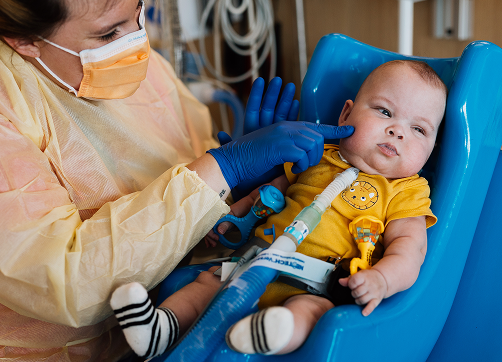charge syndrome


about condition
CHARGE syndrome is an autosomal dominant genetic condition present from birth that affects several areas of the body. The name CHARGE is an acronym for Coloboma (missing pieces of tissue in structures that form the eye), also Cranial nerve, Heart defect, Atresia choanae (now more commonly known as choanal atresia), Restricted growth and development, Genital and Ear malformations. Characteristics vary among individuals with CHARGE; however, infants often have multiple medical concerns.
symptoms
The syndrome diagnosis is based on a combination of major and minor characteristics. Here are some of the many characteristics:
- Distinctive facial features/square-shaped face/facial paralysis/facial asymmetry
- Tracheoesophageal fistula (TEF) – an abnormal connection between the esophagus and the trachea)
- Esophageal atresia (EA) – tube that connects the throat to the stomach
- Coloboma – gap or hole in one or both of the structures of the eye; can be in the iris, retina or other areas of the eye
- Possible vision issues as a result
- Microphthalmia – small, underdeveloped or missing eyes
- Choanal atresia which are blocked nasal passages or choanal stenosis which are narrowed nasal passages
- Possible breathing issues as a result
- Cleft lip and/or cleft palate
- Cranial nerve malformations that may cause swallowing problems, facial paralysis, diminished or absent sense of smell
- Feeding tube due to early swallowing problems that can cause aspiration
- Protruding ears often lacking the lobe, along with other outer ear malformations
- Hearing loss – mild to profound/ conductive and sensorineural loss
- Delayed or incomplete puberty causing genitalia malformations – small penis and/or undescended testes for males
- Wide range of cognitive function from normal intelligence to major learning challenges
- Possible absent speech and communication challenges
- Heart defects
- Slow growth in infancy
- Delayed motor skills development
Less common characteristics include:
- Kidney malformations, immune system problems, curvature of the spine, extra fingers/toes (polydactyly), missing fingers/toes (oligodactyly), club foot, and malformations of the long bones of the arms and legs

how do you treat CHARGE syndrome?
The treatment of CHARGE syndrome is focused on the specific symptoms apparent in each individual since the symptoms vary so widely. It is especially important for infants to receive early treatment to rule out issues that may need immediate attention, such as heart surgery. Your child may need a feeding tube to assist in eating until they learn to swallow, a CPAP machine to improve breathing issues, hearing aids or hearing implants for hearing loss, and possibly taking medications to treat symptoms.
Several specialties and physicians may be involved throughout the child’s life. Surgeries such as cleft lip and/or palate may be in their future. Possibly additional surgeries to correct correction of fingers and toes. Patients may see some or all of the following physician specialties: audiologist, cardiologist, craniofacial reconstructive surgeon, endocrinologist, neurologist/neurosurgeon, ophthalmologist, orthopedics, otolaryngologist (ENT) and more. Early intervention may be important to ensure that children with this syndrome reach their full potential. Special services like speech, physical and occupational therapies along with special education will be very beneficial.
faqs
CHARGE is estimated to occur in approximately 1 in 8,500 to 10,000 newborns.
Yes, CHARGE is apparent at birth. It is an autosomal dominant condition, which means it can either be inherited from one parent or occur as a result of a new sporadic mutation change in the gene. Most of the causes do occur as new mutation changes, with only a lesser amount occurring in a hereditary fashion. A small percentage of individuals with CHARGE syndrome do not have an identified mutation change in the CHD7 gene and are diagnosed by their characteristics and symptoms. Some affected individuals may have a mutation change in the CHD7 gene that has not been found yet. Others may have a change in a different gene associated with CHARGE syndrome that has yet to be named as an additional CHARGE gene. Any affected individual will have a 50% chance of passing the syndrome on to future children.
The life expectancy for a newborn diagnosed with CHARGE syndrome varies based on the severity of their symptoms. Infants with more severe symptoms have a high mortality rate within the first five years of life. Children who have mild symptoms can have a typical lifespan with lifelong supportive treatment including surgeries and other procedures.
It may not always be possible to know. If a parent has CHARGE syndrome, then there is a 50 percent chance of passing it on to their child. If the parent’s mutation change is known, the embryo can be tested during pregnancy to learn if they are positive for the condition. A doctor will physically examine your baby after birth to look for major symptoms of the condition. To confirm a diagnosis, your provider will perform a genetic blood test where they will look for mutation changes in the CHD7 gene. To make sure your child’s symptoms aren’t life-threatening, additional blood and urine tests, along with imaging tests, might be necessary to check the health of their internal organs. These tests are unique to your child their their specific symptoms. Genetic counseling is highly recommended for any individual with CHARGE syndrome having or considering a future family. It is also helpful to test other family members. If your mutation change is found, always retain a copy of the genetics report from the genetics department for safekeeping.
CHARGE syndrome is caused by mutations in the CHD7 gene, located on chromosome 8. There may also be other genes responsible that have not yet been identified.
Mutation changes in the CHD7 gene cause most of the cases of CHARGE syndrome. This gene provides instructions for making a protein that regulates gene activity (expression) by a process known as chromatin remodeling. This protein belongs to a family of proteins that are thought to play a role in the organization of chromatin. Chromatin remodeling is the intricate process of DNA and protein that packages DNA into chromosomes. This structure of chromatin can be changed/remodeled to alter how tightly DNA is packaged. When DNA is tightly packed, gene activity is lower than when DNA is loosely packed. Therefore, chromatin remodeling is one of the ways gene activity is regulated during development. Most mutation changes in the CHD7 gene lead to the production of an abnormal CHD7 protein that is broken down prematurely. This protein shortage is thought to disrupt the regulation of gene expression and chromatin remodeling. During embryonic development, this disruption likely causes the signs and symptoms of CHARGE syndrome.
- CHARGE association
- Hall-Hittner syndrome
here when you need us
Whether you’re looking for the right provider, ready to make an appointment, or need care right now—we’re here to help you take the next step with confidence.
